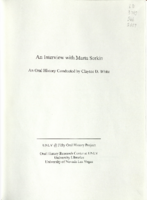Search the Special Collections and Archives Portal
Search Results

Transcript of interview with Dorothy George by Claytee White, October 13, 2003
Date
Archival Collection
Description
After serving as a nurse in World War II in Hawaii, Okinawa and Japan, Dorothy returned home to Chippewa Falls, Wisconsin. She experienced a particularly bad winter and she set out for California but stopped in Las Vegas to visit the family of her traveling companion, a girlfriend from her home town. The girlfriend returned to Wisconsin and George applied for a nursing license and got it within three days. She never left. Dorothy met her husband while working the night shift at Clark County Hospital. He would come in regularly to assist his patients in the births of their babies. Their occupations and their service in World War II drew them together in a marriage that has lasted over fifty years. From 1949 to this interview in 2003, Dorothy George has seen Las Vegas grow from a town that she loved to a metropolitan area that is no longer as friendly. She reminisces about the Heldorado parades, family picnics at Mount Charleston, watching the cloud formed by the atomic bomb tests, raising six successful children, leading a Girl Scout Troop, and working in organizations to improve the social and civic life of Las Vegas.
Text

Transcript of interview with Flo Mlynarczyk by Claytee White, July 7, 2005
Date
Archival Collection
Description
Flo Mlynarczyk began life in Fort Morgan, Colorado. Her parents divorced and she moved with her mother first to Loveland and eventually to Los Angeles. Her mother started the first Red Cross in Bell Gardens, oversaw the building of their home, and raised money for various charities. Flo remembers when the Japanese were rounded up and interred during WWII. She was in grade school and recalls that one day they all just disappeared. Upon graduation from high school in 1943, Flo moved to Kodiak, Alaska, to live with friends. She recalls total blackouts on the streets of Kodiak due to the war, the Short Snorter Club, and her return to California after a bout of pneumonia. Back in Bell Gardens, Flo worked for a department store, married and divorced in 1945, gave birth to her son Michael in 1946, and ended up in Tonopah, Nevada, with a sister who ran a cafe there. After a second marriage ended, Flo moved to Las Vegas and began working at Phelps Pump and Equipment as a bookkeeper.
Text

Transcript of interview with Ashley Hall by Claytee White, September 2, 2015
Date
Archival Collection
Description
Ashley Hall was born April 3, 1943 in Caliente, Nevada. After high school, he worked for the Union Pacific Railroad at the Nevada Test Site as a cashier and as a signalman. He later attended Brigham Young University and the University of Nevada, Reno. After college, Hall served the City of Las Vegas in significant ways. Notably, as City Manager he was instrumental in the initial development of Summerlin, Nevada. Though he has retired from local politics, he remains active as the President of the Old Spanish Trail Association and as the U.S. Army Reserve Ambassador.
Text

Transcript of interview with Janet Savalli by Irene Rostine, September 21, 1996
Date
Archival Collection
Description
Interviewed by Irene Rostine. Janet Savalli's family moved from Phoenix, Arizona, to Henderson, Nevada, in 1945 so her father could work at the Basic Magnesium plant. A few years later, when she was a junior in high school, Janet began her 46-plus years career at the Southern Nevada Telephone Company, which eventually became Sprint. During that period she held several positions, including operator, supervisor, schedule clerk, trainer, investigator, and community relations coordinator. Janet also talks about the atomic bomb testing at Camp Mercury and Camp Desert Rock near Las Vegas. Janet credits the atomic bomb testing with jump-starting the second wave of growth Las Vegas experienced following World War II. This growth had a particular influence on the telecommunications industry's need to expand in Las Vegas.
Text

Transcript of interview with Jackie Boiman by Barbara Tabach, March 27, 2015
Date
Archival Collection
Description
Jackie, n?e Brooks, Boiman was born in Brooklyn and raised in Levittown, New York. Although Jackie recalls her family?s Jewish observance as far less than strict, her religious connection began in the Levittown Jewish Center Sunday School and under the close relationship she had with her grandmother, who kept kosher and inspired her to do so. In her early twenties, Jackie worked in data reduction at Grumman Aerospace Corporation and the space program; was married and had her only child, Andee. After twelve years of marriage, Jackie divorced and relocated to Las Vegas, where her parents had moved earlier. In Las Vegas, job opportunities for a single mother were scant. Then after months of searching, she found her first job as a part time secretary for Temple Beth Sholom. Over the course of the next nearly fifteen years, Jackie would go on to work with almost every congregation and temple in Las Vegas, developing their youth programs and contributing to the growth of each one for 15 years. After a brief retirement, she had gone back to work as the first administration person for Touro University. In this interview, Jackie discusses at length her involvement with each of the temples, her experiences with being a single mother and living below the poverty line. She shares how her life has been changed through trials and tribulations but how her faithfulness and commitment to her mission had led her to the success she has today.
Text

Transcript of interview with Rabbi Malcolm Cohen by Barbara Tabach, December 16, 2015
Date
Archival Collection
Description
In this interview, Rabbi Malcolm Cohen speaks about observed differences between British and American Jewish communities as well as new Temple Sinai initiatives to build community and engage younger congregants. Rabbi Cohen and his wife have two children, Elijah and Rachel.
Rabbi Malcolm Cohen was born on October 7, 1973 in London, England. He describes having the typical Reform Jewish upbringing of a second generation Londoner. His mother worked as an office assistant, and his father ran a bookshop and also prepared youth for their bar and bat mitzvahs. It was his father?s dedication to Jewish education and service that greatly influenced his career path. After earning a degree in psychology from Southampton University, Rabbi Cohen went on to get a professional qualification in youth and community work. He subsequently became the British Reform movement?s first outreach officer, leading the efforts to engage 20- and 30-year-olds to Judaism. At his wife, Sarah?s, encouragement, Rabbi Cohen enrolled in Leo Baeck College to become a rabbi. Upon finishing his studies in 2006, he got a job at West London Synagogue, a large Reform congregation, where he worked with a team of rabbis. In 2009, Rabbi Cohen took the position as Temple Sinai?s rabbi, where he has served ever since. In this interview, he speaks about observed differences between British and American Jewish communities as well as new Temple Sinai initiatives to build community and engage younger congregants. Rabbi Cohen and his wife have two children, Elijah and Rachel.
Text

Transcript of interview with Dr. Leonard Kreisler by Barbara Tabach, May 23, 2016
Date
Archival Collection
Description
Dr. Leonard Kreisler, MD, was born August 3, 1930 in Brooklyn to post World War I European Jewish immigrants. Raised in the smaller community of White Plains, New York, he worked happily by his father?s side. The elder Kreisler was a cabinet maker and carpenter, who Len describes as fiercely independent. Young Len keenly helped his Yiddish language father write his contracts and guided him to increasing his prices. At an early age, Len knew that he would become a medical doctor?little did he know what an amazing life was in his future. It was while attending the University of Vermont, College of Medicine that Len met his wife Joan. They married in June 1957. Joan became a teacher and later a real estate agent while in Las Vegas. This interview includes stories about his medical education and his thirteen year private medical practice in Peekskill, New York. This was followed by a career in occupational medicine and over seventeen years as the Medical Director at the Nevada Test Site for Reynolds Electric and Engineering Corporation (1973 ? 1990). During that time he was also elected Chief of Staff at University Medical Center (UMC) for two years and helped create the Children?s Miracle Network Telethon and the UMC Foundation. When he recalls moving to Las Vegas, his memories include jogging by Temple Beth Sholom and joining a minyan. He became a congregation vice president. When his career at the Test Site was halted, his medical adventure led him to be a maritime physician for a cruise liner. He also ran twice for Clark County Commissioner against Thalia Dondero. Dr. Kreisler is the author of several books: Death by Any Means (2005); Roll the Dice, Pick a Doc and Hope for the Best (2009); The Codes of Babylon (2010); Shortfall (2011); The Obligated Volunteer (2014) and In Bed Alone, A Caregiver?s Odyssey (2016).
Text

Transcript of interview with Priscilla Schwartz by Barbara Tabach, June 16, 2016
Date
Archival Collection
Description
In this interview, Schwartz talks at length about her passion for compassionate hospice care, and her broad involvement with the Nathan Adelson Hospice, from volunteering to serving on the board to philanthropy, which included opening the Walter Schwartz Center for Compassionate Care. Schwartz also talks about other philanthropic giving which includes establishing scholarships at George Washington University and University of Michigan as well as support to Temple Beth Sholom gift shop.
Text

Transcript of interview with Marta Sorkin by Claytee White, March 2, 2009
Date
Archival Collection
Description
In this interview, conducted for the 50th anniversary of UNLV, Marta Sorkin discusses her family and her experience moving to California, and then to Las Vegas. Sorkin worked at the James R. Dickinson Library at UNLV and later in Lied Library, helping to implement and update various databases, and create displays on current topics. She briefly discusses her involvement with Hillel and the Jewish Federation of Las Vegas.
Marta Sorkin begins by reminiscing about her childhood in Far Rockaway Long Island, New York. She details the life her parents lived, which set an example for Marta and her two siblings. Through hard work, advanced education, and involvement in causes that were important to them, they created the template by which Marta lives her life. Marta describes her early work history, which included modeling, sales, library work, and working part time in her father's dry-cleaning plant. She and her daughter were living with her parents for a time in California, and they visited Las Vegas on weekends. It was during one of those visits that Marta met her second husband-to-be. They eventually married and decided to settle in Las Vegas. In Las Vegas, Marta enrolled at UNLV, became involved with the Preservation Association of Clark County, and volunteered at the Jewish Federation of Las Vegas. In addition, she completed her BA and MA degrees at UNLV and started working at the university's library. She details her work there, including creating display cases, working in the reference section, doing research for students and faculty, and compiling interviews. Marta also describes the fundraisers she spearheaded to help raise money for the various societies she was involved with: non-events, pancake breakfasts, dinners, and dance and band performances. In her closing comments she mentions an interview she did for Ralph Roske's class and expresses her appreciation for the career she's had at UNLV.
Text

Transcript of interview with Lovee duBoef Arum by Barbara Tabach, November 1, 2016
Date
Archival Collection
Description
Lovee Arum is the Chief Financial Officer of the Morris A. Hazan Family Foundation and Director of Hospitality for her husband Bob Arum?s boxing promotion company Top Rank. She holds a Nevada Real Estate Broker Sales License and was a partner in Western Linen (a Las Vegas linen rental and laundry company) for many years. Arum is a volunteer and philanthropist in the Las Vegas, Nevada community and works with organizations such as Temple Beth Sholom and the Nathan Adelson Hospice. In this interview, Arum reflects upon her childhood in Beverly Hills, California, and first experiencing Las Vegas after her father, Morris Hazan, established Western Linen. She discusses adjusting to Las Vegas life after moving to the city with her first husband, Larry duBoef, in 1963, and raising her daughter and son within the local Jewish community. Arum also talks about meeting her current husband, Bob Arum, and her various philanthropic activities, including Junior League, United Jewish Appeal, Keep Memory Alive and establishment of the Lou Ruvo Center for Brain Health.
Text
